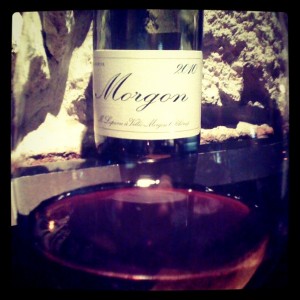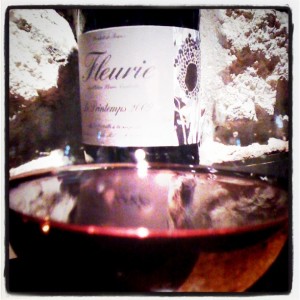Nov 8, 2011
Too Beaujolais, or not too Beaujolais
Out with the bad reputation, in with the good?
Marcel Lapierre, who died last year, was perhaps the most important person to help save the reputation of the Beaujolais region, which was mostly known by the masses as “that place” where Beaujolais Nouveau comes from. Always sour, rarely drinkable, until producers such as Marcel Lapierre, Jean Foillard, Guy Breton, Jean-Paul Thévenet and let’s not forget Yvon Métras came along and stopped adding selected yeasts to their Gamay grapes, or anything else for that matter. The recipe was easy, healthy grapes and a lot of hard work.
Now, I will admit that I never had the fortune to taste the wines made by Marcel Lapierre (his last vintage I believe was the 2009), due to importer/logistic problems I had in Norway. What, you say?! Never tasted the fruit of Marcel’s hard work?! Nope. Never. Nada
So, brace yourself as I taste the 2010 Morgon Sans Soufre *(please see “comments” below). In fact, i tasted the 2010 vintage on 2 separate occassions. And I disliked the wine on two separate occasions.
November 4th at 19:00
Yes, the nose was intense in the sense that the aromas just jumped out of the glass. But, something peculiar…. I could swear that I felt sulfur. Yes, I know that natural fermentation will produce sulfur, but since none was added to this wine*(please see “comments” below) during the wine making (I expected the final number to be low) I was surprised to find it there – stinging my nose. And i also found this on other Lapierre wines from the 2010 vintage. I found this on this Morgan (both bottles I tasted) and on the Raisins Gaulois…. In all the 2010 wines I tasted, aromas that were not very exciting jumped out of the glass. I didn’t find the aromas so fruity, but rather green like what you would get from underripe fruit. There were some small red berries also, but the green was dominant. Too dominant.
On the palate much of the same; green mostly with some light red berries and a structure and concertration that left me wondering if I was drinking an ordinary Beaujolais Nouveau.
After struggling through a couple glasses trying to grasp this wine, I decided to put it in the fridge until the next day to see if it improved, after all this was a Lapierre Morgon.
November 5th, 18:35
Appearance: Same as last night, a pale red, not very intense wine with a very slightly hazy, unfiltered look to it (which I liked)
Nose: most of the stinging I felt yesterday on the nose was gone. But there was still that sour, red fruit with dominating green notes I nosed yesterday. The wine is just not very ripe. One day or 5 years wasn’t going to change that. I just keep going back to that glass trying to find what it was that everyone spoke so highly of. I was really searching for that purity of fruit, and I just couldn’t find it. There were some hints of fruit in the form of little red berries and vague hints of watermelon, but not the pink juicy part, but rather the green meat closer to the skin..
Palate: In the mouth, the wine was showing the fruit a bit better than on the nose and a bit better than yesterday. The watermelon was there as well, but mostly the light pink part near the skin. The tannins have gotten a bit more aggressive than yesterday and were now dominating along with the underripe fruit. The acidity was quite high, but not that ripe, juicy acidity I enjoy that helps carry the wine to a long and happy ending that leaves you wanting to start again from the beginning. That first sip that leads you fall in love with a wine. This just doesn’t have that feeling for me. I don’t want to take another sip, and why would I when my mouth still feels «bruised» from that first sip. But most of all, this wine lacked some serious depth. Depth I would expect from a Morgan. Disappointed.
Some might wonder if this was a bad bottle, but the fact is it’s the second bottle I have tasted of Lapierre’s 2010 Morgon..or perhaps I’ve never really tasted a Morgon made by Lapierre. Or perhaps it’s a 2010 vintage issue.
Now, by contrast, I happened to have a bottle of Yvon Metras 2009 Fleurie Le Printemps in my cellar, so I thought what the hell. Let’s do another one of those odd comparisons i love to do just because i can 🙂 Yea, I know, two different vintages, two different Villages. So what.
After coming off tasting a 2010 Lapierre Morgon, one would expect that i may be disappointed, but I say that after the Lapierre it would be hard to be disappointed.
November 5th, 19:00
Nose: just as intesne as the Lapierre Morgon, but what, what is that I smell? Fruit, fruit and loads of it. Not under ripe and not overripe either, but really nice and fresh. Cranberries with a slight hint of peppery spice.. now I knew I was smelling a Gamay. Hints of barnyard and purple flowers give this wine a bit of edge that tends to make me smile. A wild side you might say. And none of that “sulfur” sting I experienced from the Lapierre.
Palate: Ah, balance, fruity with an amazing sweet cranberry finish. Fruit all the way from start to finish and what a finish it was, juicy with some cleansing tannings along the way. I would say quality here.
Great acidity that surrounded the wine just fine. Refreshing and begging me to take another sip, and so I did over and over again. The fruit was only just a bit dominant if I was to be crtitical. But, this is something that time will surely sort out. The wine is deep deep deep, something the Morgon was not. Another component that the Morgon lacked was concentration, which is something this wine has nothing to apologize for. Concentration could be it’s middle name.
Oh, and did I forget to say the word elegance? The wine was quite elegant, perhaps one of the most I have tasted from Beaujolais.
In the end I have to say that this wine isn’t exactly in my style, but it was in my opinion (not taste) that it was a better wine than the Lapierre Morgon. What I didn’t love about this wine is that there was a disturbing sweet note tied to the fruit, one which today is noticable but will very likely disappear in a few years.
Lapierre Morgon 2010 – light, green and bitter with the ability to leave the mouth a bit sore and not wanting more. A Morgon disguised as a Beaujolais Nouveau, sorry.
Métras Fleurie Le Printemps 2009– serious depth wrapped in juicy fruit, lively acidity and enough tannins to make it the perfect mate to food. Elegant and concentrated. Win

